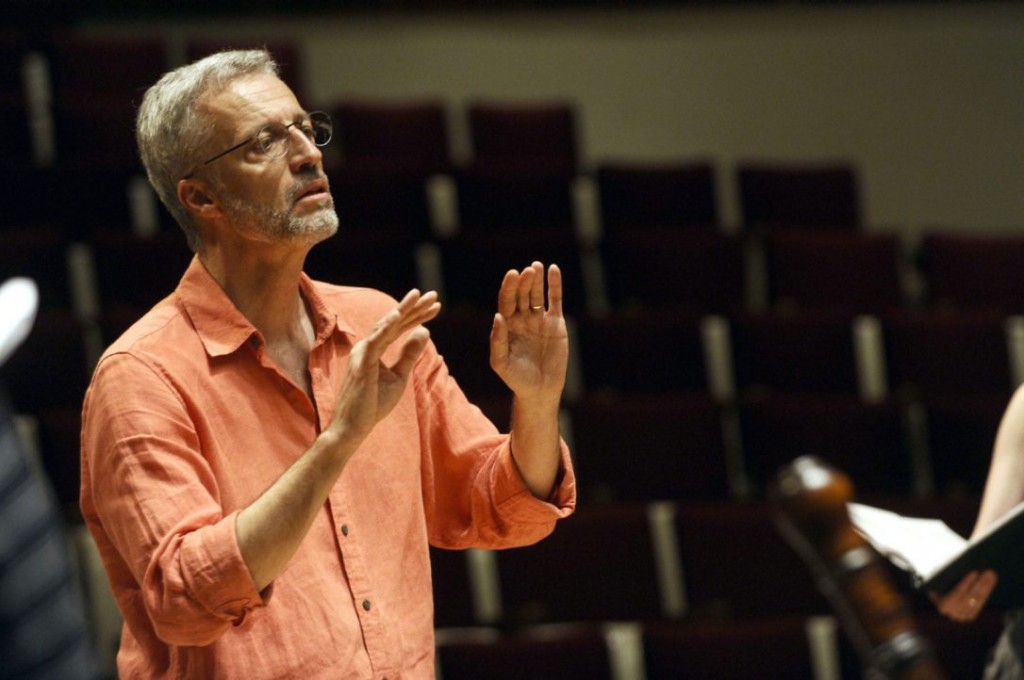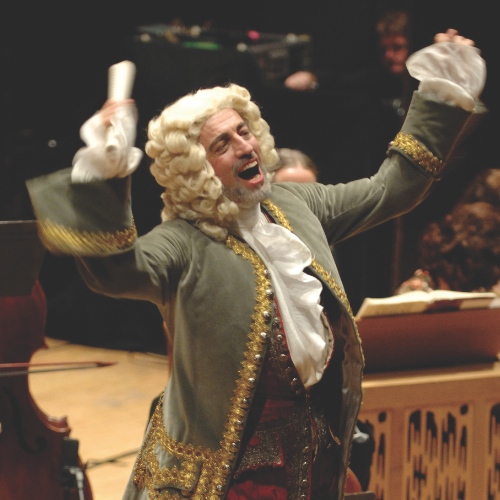Photos by Gary Beechey
JAMES STRECKER: If you were asked for 50 words for an encyclopedia to summarize what you do, what would you say?
IVARS TAURINS: I guess I’d have to open with: an “HIP” (historically-informed performance) conductor, enjoying a career in which I’m equally comfortable in both orchestral and choral repertoire, with an added “specialist” interest in 17th c. to early 19th c. repertoire (i.e. baroque and classical).
The “HIP” aspect is, though, for me the credo of my musical expression in all music, whether I’m conducting Purcell or Poulenc, Bach or Brahms. I find great satisfaction in learning how to appreciate and experience something on its own terms, rather than through a translation that fits my own comfort zone of familiarity.
Sorry, that’s over 100 words. (Editor’s note: My pleasure)
JS: What important beliefs do you express in your work?
IT: Hopefully, a communication of emotions and messages that strike one to the core of one’s soul, whether it be with the musicians I’m collaborating with, or with the audience. I agree wholeheartedly with the late Nikolaus Harnoncourt’s statement (and I’m paraphrasing here) that he would prefer it if half the audience were totally convinced by a performance of his, and the other half hated it, rather than to have everyone in the audience equally think it was “nice.” He once announced at a concert “I wish you not a nice evening, but a stirring one,” mirroring Handel’s line to Lord Kinnoull, after the latter’s compliments on the “noble entertainment” of his Messiah: “I should be sorry if I only entertained them, I wish to make them better.”
JS: Name two people, living or dead, whom you admire a great deal and tell us why for each one.
IT: Both sadly gone: Nikolaus Harnoncourt, and Carlos Kleiber. Both were filled with the fire of music, and with an understanding of its potency, purpose and deep spirituality. They breathed it – and its expression was made manifest through their remarkable communicative powers. To watch Carlos Kleiber, for example in the rehearsal film-clip of him directing the ‘Liebestod’ from Wagner’s Tristan und Isolde, or conducting Beethoven’s 7th symphony with the Royal Concertgebouw Orchestra, or Harnoncourt rehearsing the Beethoven symphonies is a rich lesson in and of itself.
JS: How have you changed since you began to do creative work?
IT: I think that, as in all things, experience, age, and maturity temper and inform one’s creative work. But I don’t think that I’ll ever lose my sense of child-like wonder and exuberance when hearing or making music.
JS: What are your biggest challenges as a creative person?
IT: Self-doubt -and the realization that the one’s efforts can ultimately never, ever reach the perfection one strives to attain.
JS: Please describe at least one major turning point in your life.
IT: Listening to a recording at around the age of 17 of a Concerto for 4 violins in G major by Telemann, played on period instruments (Harnoncourt, again). It was an epiphany – a “portkey” to a new and wondrous world of expression and sonorities. And, as many of my colleagues have said about their first experiences with period performance, it felt right.
JS: What are the hardest things for an outsider to understand about what you do?
IT: That my work is not a 9-5 experience, that directing a rehearsal, or teaching a conducting class can be as exhausting and invigorating as running a marathon. That a musician’s life isn’t governed by a Monday to Friday framework.
JS: How and why did you begin to do creative work in the first place?
IT: I don’t think anyone really chooses to begin “creative work”. It is a need that craves to be fulfilled. One doesn’t set out to be creative, just the same as one cannot govern what creative genes will be passed down to you (or not).
JS: What haven’t you attempted as yet that you would like to do and please tell us why?
IT: I have so many other interests outside of music that I only can find time to dabble in. If I had another life, I’d want to devote it to some sort of creative work in museums, art or decorative art restoration work, historical costumes, curatorial work….
JS: What are your most meaningful achievements?
IT: Though not actually an “achievement” per se as much as a fulfillment, firstly, my family: my wife Charlotte, and our daughters Larissa and Madeleine.
Secondly, being part of Tafelmusik for over 3 1/2 decades, and through that collaboration seeing many corners of the world, experiencing other cultures, and making music with so many inspirational musicians -and sharing that life-experience with my wife, Charlotte Nediger, who has also been an integral part of Tafelmusik over these many years.
JS: What advice would you give a young person who would like to do what you do?
IT: Don’t try to emulate someone else’s experience. Create something that is truly your own. In the end, it will be far more rewarding.
JS: What do you ask of your audience?
IT: I don’t ask anything of my audience, except perhaps an open mind and willingness to share in an experience that may be new to them. But that willingness must be built on a foundation of trust, an acknowledgement that what we are presenting and sharing with them is of the highest possible excellence. With that mutual trust and respect in place, both musician and audience can explore and experience the wonderful tastes of many musical cuisines, some familiar, some new.
JS: What specifically would you change about what goes on in the world?
IT: That culture is not a four-letter word, or an elitist pastime. That it is the very fabric of our existence. The word culture comes from the Latin cultura stemming from colere, meaning “to cultivate”. And Culture needs to be cultivated and nourished. It is not a commodity to be turned on and off like tap water at our whim – it is a precious gift and legacy to be protected and tended if it is to grow and flourish. Whether it is the Parthenon, or the Taj Mahal, Bach’s Goldberg Variations or Mozart’s Requiem, the Mona Lisa or the frescoes of Pompeii, we have all been shaped by the cultural relevance of these precious things.
JS: If you could relive one experience from your creative life, what would it be and why would you do so?
IT: I’m not actually sure that I’d want to relive a creative experience again. I think it would be coloured by one’s hindsight, and by one’s critical observation, and, because of that, lose something of its essence and magic. The same is true, I find, when one relives a live performance through a recording.
JS: Name two places you would like to visit, one you haven’t been to and one to experience again and briefly tell us why.
IT: I’d like to visit Scandinavia, particularly Sweden and Norway, or the far northern reaches of Scotland. I’d like to revisit the beaches of the north coast of Norfolk, or the rugged cliffs and turquoise waters of North Devon… and I’ll always yearn to have a dose of Tofino, British Columbia, with its miraculous mix of ocean, mountains, beaches and rain forests.
Why? The same answer for all – Nature is so revitalizing – it puts everything into its proper perspective, and it never ceases to overwhelm with its beauty and purity.
JS: Please tell us about one or more projects that you have been working on, are preparing, or have recently completed. Why do they matter to you and why should they matter to us.
IT: The Tafelmusik Chamber Choir celebrates its 35 anniversary this season, and we are in the midst of rehearsals for the choir’s first programme of the season – a celebration including works by Handel, Rameau, Zelenka, Lully, and Steffani. Later in the season, we’ll be presenting “A Bach Tapestry” – I’ve created a programme of lesser and well-known choruses from Bach’s cantatas woven together with instrumental works, including new arrangement for strings of his Italian Concerto.
We will of course have our annual concert performances of Handel’s Messiah at Koerner Hall in Toronto, and then Mr. Handel (aka yours truly), who will soon be powdering his wig and brushing off his finest suit, will once again lead the proceedings (and an audience chorus of 2,700) at Tafelmusik’s Sing-along Messiah – this season celebrating its 30th anniversary!
Finally, our season will culminate in performances of Mozart’s remarkable Mass in C-Minor.
In March, I’ll be heading out to British Columbia to guest direct the Victoria Symphony in a programme of Mozart and Haydn.
And I’m already researching and planning programmes for the 2017-18 season, both with Tafelmusik, and also with the Calgary Philharmonic Orchestra, where I curate and direct an annual Bach festival.
Why does it – why should it – matter to me, or you? Please see my previous answers concerning my important beliefs, why I began to do creative work, what I ask of an audience, and what I would change about what goes on I the world.


